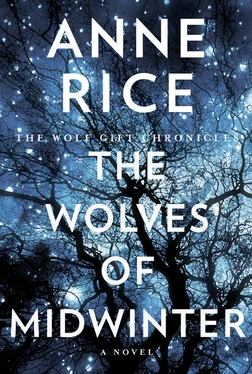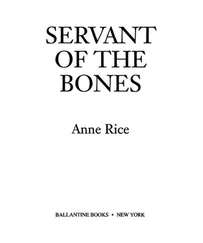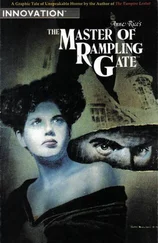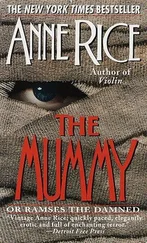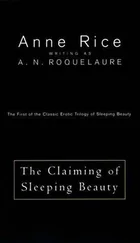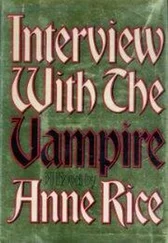Reuben nodded.
“That’s why the statues are still there, in the cellar, after all these years. That’s why I brought them here from my homeland. That’s why I built this house. That’s why I am back under this roof, and you and Laura are an essential flame! You and Laura and the promise of what you are. Hmmm. I don’t have your gift for words, Reuben. I make it sound as if I need you to love one another. That’s not right. That’s not what I meant to say at all. I come to warm my hands at a blaze and to marvel at it. That’s all.”
Reuben smiled. “I love you, Felix,” he said. There was not a lot of emotion in his voice or in his eyes, only a deep and comfortable conviction, and the conviction that he was understood, and that no more words really were necessary.
Their eyes met, and neither needed to say a word.
They went on up the stairs.
In the dining room, Margon and Stuart were still at work. Stuart was going on about the stupidity and vapidity of rituals, and Margon was protesting softly that Stuart was being an incorrigible nuisance on purpose, as if he were arguing with his mother or his old teachers at school. Stuart was laughing impishly and Margon was smiling in spite of himself.
Sergei wandered in, the great blond-haired giant with the blazing blue eyes. His clothes were streaked with rain and dirt, his hair full of dust and bits of broken leaf. He looked ruddy and dazed. A curious silent exchange passed between Sergei and Felix, and a strange prickling feeling came over Reuben. Sergei had been out hunting; Sergei had been the Man Wolf tonight; the blood was pounding in him. And Reuben’s blood knew it and Felix knew it. Stuart too sensed it, eyeing him with fascination and resentment, it seemed, and then glancing at Margon.
But Margon and Felix simply went back to work.
Sergei drifted off to the kitchen.
And Reuben went up to get snug with his laptop by the fire and research Christmas customs and the pagan customs of Midwinter, and maybe begin an essay for the Observer . Billie, his editor, was calling just about every second day. She wanted more material from him. So did the readers, she said. And he liked the idea of penetrating the different attitudes, positive and negative, towards Christmas, of probing why we were so ambivalent about it, why the ancient traditions often disturbed us as much as the spending and shopping, and how we might start thinking about Christmas in a fresh and committed way. It felt good to think of something other than the old cynical cliches.
Something occurred to him. He realized he was trying to figure a way to express what he was learning now without revealing the secret of how he was learning it, and how learning itself for him had so totally changed. “This is the way it will be,” he whispered. “I’ll pour out what I know, yes, but there will always be a holding back.” Even so, he wanted to get busy. Christmas customs, Christmas spirit, echoes of Midwinter, yes.
TWO A.M.
The house slept.
Reuben came down the stairs in his slippers and heavy wool robe.
Jean Pierre, who often took the night shift, was sleeping on his folded arms at the kitchen counter.
The fire in the library was not quite out.
Reuben stirred it, brought it back to life, and took a book from the shelves and did something he had always wanted to do. He curled up in the window seat against the cold window, comfortable enough on the velvet cushions, with a throw pillow between him and the damp chill panes.
The rain was flooding down the glass only inches from his eyes.
The lamp on the desk was sufficient for him to read a little. And a little, in this dim uncommitted light, was all he wanted to read.
It was a book on the ancient Near East. It seemed to Reuben he cared passionately about it, about the whole question of where some momentous anthropological development had occurred, but he lost the thread almost at once. He put his head back against the wood paneling and he stared through narrow eyes at the small dancing flames on the hearth.
Some errant wind blasted the panes. The rain hit the glass like so many tiny pellets. And then there came that sighing of the house that Reuben heard so often when he was alone like this and perfectly still.
He felt safe and happy, and eager to see Laura, eager to do his best. His family would love the open house on the sixteenth, simply love it. Grace and Phil had never been more than casual entertainers of their closest friends. Jim would think it wonderful, and they would talk. Yes, Jim and Reuben had to talk. It wasn’t merely that Jim was the only one of them who knew Reuben, knew his secrets, knew everything. It was that he was worried about Jim, worried about what the burden of the secrets was doing to him. What in God’s name was Jim suffering, a priest bound by the oath of the Confessional, knowing such secrets which he could not mention to another living being? He missed Jim terribly. He wished he could call Jim now.
Reuben began to doze. He shook himself awake and pulled the soft shapeless collar of his robe close around his neck. He had a sudden “awareness” that somebody was close to him, somebody, and it was as if he’d been talking to that person, but now he was violently awake and certain this could not possibly be so.
He looked up and to his left. He expected the darkness of the night to be sealed up against the window as all the outside lights had long ago gone off.
But he saw a figure standing there, looking down at him, and he realized he was looking at Marchent Nideck, and that she was peering at him from only inches beyond the glass.
Marchent. Marchent, who had been savagely murdered in this house .
His terror was total. Yet he didn’t move. He felt the terror, like something breaking out all over his skin. He continued to stare at her, resisting with all his might the urge to move away.
Her pale eyes were slightly narrow, rimmed in red, and fixing him as if she were speaking to him, imploring him in some desperate way. Her lips were slightly parted, very fresh and soft and natural. And her cheeks were reddened as if from the cold.
The sound of Reuben’s heart was deafening in his ears, and so powerful in his arteries that he felt he couldn’t breathe.
She wore the negligee she’d worn the night she was killed. Pearls, white silk, and the lace, how beautiful was the lace, so thick, heavy, ornate. But it was streaked with blood, caked with blood. One of her hands gripped the lace at the throat—and there was the bracelet on that wrist, the thin delicate pearl chain she’d worn that day—and with the other hand she reached towards him as if her fingers might penetrate the glass.
He shot away, and found himself standing on the carpet staring at her. He had never known panic like this in all his life.
She continued to stare at him, her eyes all the more desperate, her hair mussed but untouched by the rain. All of her was untouched by the rain. There was a glistening quality to her. Then the figure simply vanished as if it had never been there.
He stood still, staring at the darkened glass, trying to find her face again, her eyes, her shape, anything of her, but there was nothing, and he had never felt so utterly alone in his life.
His skin was electrified still, though he had begun to sweat. And very slowly he looked down at his hands to see they were covered in hair. His fingernails were elongated. And touching his face and hands, he felt the hair there as well.
He’d begun to change, the fear had done that to him! But the transformation had been suspended, waiting, waiting perhaps for his personal signal as to whether it should resume. Terror had done that.
He looked at the palms of his hands, unable to move.
Читать дальше
